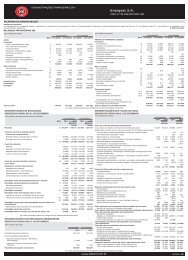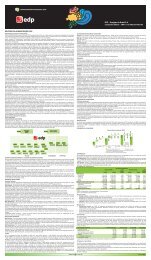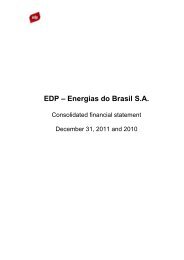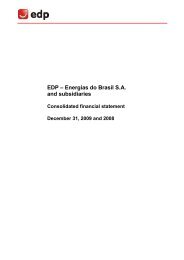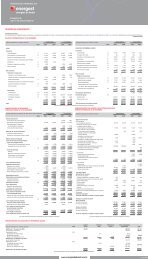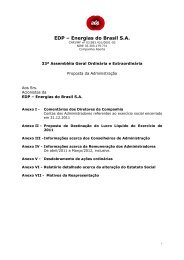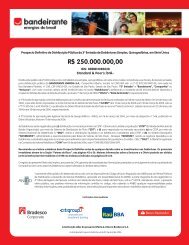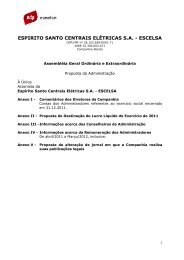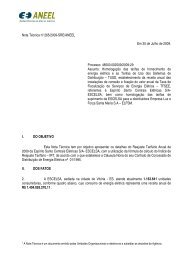19919510 COMMON SHARES EDP – Energias do Brasil SA
19919510 COMMON SHARES EDP – Energias do Brasil SA
19919510 COMMON SHARES EDP – Energias do Brasil SA
You also want an ePaper? Increase the reach of your titles
YUMPU automatically turns print PDFs into web optimized ePapers that Google loves.
environmental licenses, among others, for the development of new projects and for the installation and<br />
operation of new equipment necessary for our operations. These rules are complex and may change with<br />
time, hindering or even precluding our ability to comply with the applicable requirements, which could<br />
prohibit our current or future operations. Nongovernmental organizations and the public in general have the<br />
right to comment on and otherwise follow the licensing procedures, including the proposal of legal<br />
measures in order to suspend or cancel them, or request public authorities to <strong>do</strong> so. Moreover,<br />
governmental agencies may impose sanctions against us in the event we fail to comply with the safety,<br />
health and environmental laws. These sanctions may include, among others, the imposition of fines, permit<br />
cancellation and the stoppage of work and activities. Furthermore, failure to comply with these laws may<br />
also result in criminal charges against us and our managers, in addition to the obligation to repair or<br />
indemnify possible damages. Compliance with safety, health and environmental laws may force us to incur<br />
capital expenditures and, as a result, divert resources from planned investments, which may adversely<br />
affect our financial condition and results of operations.<br />
Changes to environmental laws and regulations may have an adverse effect on the business of electricity<br />
power companies in Brazil, including us.<br />
Electricity companies in Brazil are subject to comprehensive federal, state and local environmental<br />
legislation, including laws related to atmospheric emissions and interference with environmentally<br />
protected areas. We are required to obtain environmental licenses and permits from governmental agencies<br />
in order to conduct our activities. Brazilian government agencies could bring enforcement actions against<br />
us for any failure to comply with applicable laws. Such enforcement actions could include, among other<br />
things, the imposition of fines, revocation of licenses and suspension of operations. Such failures may also<br />
result in criminal liability (including criminal liability of our officers and directors). The Attorney’s Office<br />
(Ministério Público) may conduct a civil investigation and/or file a civil class action suit claiming<br />
indemnifiable damages caused to the environment and to third parties and seek injunctive relief.<br />
Governmental agencies or other governmental bodies may also create new and more stringent rules or seek<br />
to interpret existing laws and regulations in a more restrictive way, including requiring new environmental<br />
licenses for facilities and equipment, thereby causing electric power companies, including us, to spend<br />
additional funds on environmental compliance. Governmental agencies may also significantly delay the<br />
issuance of licenses and permits needed for the development of the businesses of electricity companies,<br />
including us, causing delays in project implementation schedules. Any action in this regard taken by<br />
governmental agencies may have a negative impact on the Brazilian electricity industry and an adverse<br />
effect on our business and results of operations.<br />
Our customers may no longer use our distribution system.<br />
A significant portion of our net operating revenues from the use of our distribution system are derived<br />
from the Distribution Network Use Tariff (Tarifa de Uso <strong>do</strong> Sistema de Distribuição), or TUSD, charged to<br />
free and special customers in our concession areas. If these customers directly connect themselves to the<br />
Basic Network (Rede Básica), our operating revenues may be adversely affected. We cannot guarantee that<br />
the our main customers are not currently intending to directly connect to the Basic Network, or to implement<br />
self-generation projects. If so, our results of operations could be adversely affected. In addition, TUSD tariffs<br />
are established by ANEEL based on inflation rates and the amount of investments and costs budgeted for the<br />
expansion, maintenance and operation of the distribution system in the previous year. Therefore, our results of<br />
operations may be adversely affected if TUSD tariffs are not adequately adjusted by ANEEL.<br />
Environmental damages resulting from our operations may subject us to incur costs, which may negatively<br />
impact our business and the market price of our securities.<br />
The operations of electric power companies may cause significant environmental damage. Brazilian<br />
federal laws provide for strict liability to perform environmental remediation and to indemnify third parties<br />
for environmental damage, notwithstanding culpability. In addition, for environmental recovery costs, federal<br />
laws may consider piercing the corporate veil of companies that cause environmental damage as well as<br />
company officers and directors who may be held personally liable. The payment of substantial recovery costs<br />
for environmental damages may adversely affect our results of operations and financial condition as well as<br />
16



